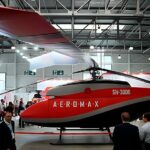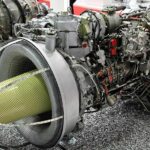The development of a domestic hydrogen propulsion system for civilian drones will be undertaken by the Centre for Hydrogen Technologies LLC on behalf of the Aeromax company. Within the framework of the project it is planned to create an electrochemical generator on the basis of a hydrogen-air fuel cell with the capacity of up to 100 kW.
The technology is based on generating electrical energy through the chemical reaction of hydrogen and oxygen. It is expected that this unit will be able to lift an unmanned cargo helicopter with a take-off weight of 750 kg. The first prototypes will be unveiled this year, Aeromax’s press office said.
The propulsion system for an unmanned aerial vehicle is being developed based on technology successfully used in the automotive industry. Existing solutions need to be adapted to work within the voltage range of the drone’s on-board power system. Other refinements will be needed, such as integrating the power plant with cooling and control systems into the drone.
The drone will require special attention to safety and design solutions to reduce its weight and size. The electrochemical generator must ensure reliable operation in the entire range of loads, including at low temperatures. This is due to the fact that Aeromax unmanned helicopters are mainly used for cargo transport in the north of the country.
The design of the unit is based on the availability of its own component base and the priority use of domestic components.
The efficiency of using a hydrogen fuel cell surpasses that of electric motors and tends to approach that of classic power units that run on diesel or petrol fuels. At the same time they are environmentally friendly, as they produce no harmful emissions, are quiet and easy to maintain. Hydrogen technology is actively used in various fields and we are planning to introduce it in our aircraft and soon introduce a hydrogen-powered cargo drone.
The research and development work will take one year. The first prototypes will be presented this summer as part of the SH-750 unmanned aerial vehicle, and flight tests of the first hydrogen fuel cell-powered UAVs are scheduled for the autumn.
“Hydrogen units are already successfully used in copters, increasing flight time at the expense of high energy capacity. Now we are facing the ambitious goal of creating a fuel cell for unmanned vessels with a take-off weight of several hundred kilograms,” commented Yury Dobrovolsky, General Director of Hydrogen Technology Centre LLC.







